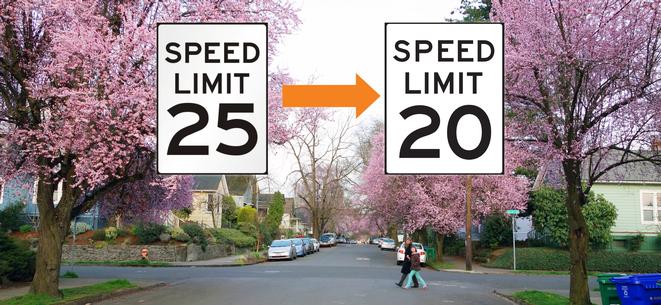To improve traffic safety and make streets more welcoming for walking and biking, Portland will lower speed limits on nearly all of its residential streets to 20 miles per hour, in most cases replacing a 25 mph limit.
The change was approved unanimously Wednesday by the Portland City Council. About 70 percent of the city's street mileage will have the new 20 mph limit.

"The severity of a crash is largely tied to speed," Portland Bureau of Transportation Director Leah Treat told Streetsblog. "Someone who reduces their speed from 25 to 20 miles per hour, that means a pedestrian is twice as likely to survive."
Reducing residential speed limits is one of 32 actions in Portland's Vision Zero plan to eliminate traffic fatalities by 2025. The city won permission from the state legislature to change its speed limits last year.
In addition to the safety benefits, Treat says the change will offer a variety of quality-of-life benefits to residents as well.
"It’s going to help kids get to school," she said. "Lots of kids walk and bike to school, this will help kids get to school safely."
By April 1, Portland will have 2,000 signs in place informing drivers of the 20 mph limit. The city is also planning a large-scale public awareness campaign, with radio and television ads.
Portland will continue to enforce traffic speeds, but police are going to be encouraged to remain focused on the most dangerous corridors in the city, and those are primarily arterial streets that won't be affected by the change.
Treat says she expects the ordinance to gradually influence street design, as well.
"Lowering of the speed is going to have an impact on how the engineer assesses how a street works, when residents request things like speed bumps," she said.
Portland has to reverse a recent increase in traffic fatalities. Last year, 45 people were killed in traffic collisions, up from 37 in 2015.






